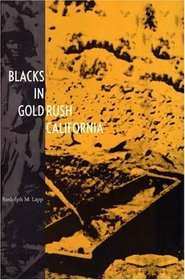Leo T. reviewed Blacks in Gold Rush California (Yale Western Americana Series) on + 1775 more book reviews
A very great deal of research went into this quite excellent work of history. Dr. Lapp (and I suspect his students) had to read what newspaper accounts exist, as well as eastern papers (especially those of the abolitionist 'troublemakers') to find scattered references to Black life, work, and business. In my opinion, Dr. Lapp is too censorious of the obstacles Black folk encountered. My various ancestors have long lived on the Coast and I feel it was an uphill climb for everyone. For example, I just read some of 'Our Nig' written by a lady who had a hard time despite residing in Massachusetts, where there were many fair minded people, compared to the border states, for example.
He celebrates their victories (some did prosper greatly) and tries to draw informed conclusions from the limited data he has unearthed. This is largely unplowed ground because the information is so hard to acquire. For example, there are many diaries and letters by people who came West via Panama or overland, but Black people are mentioned only in passing and rarely by name. The most surprising finding for me personally was that some idiots returned to the slave states with their masters.
I did not realize that so many (relatively) slaveholders brought bondsmen as servants or to work the placers. Dr. Lapp offers good detail on various court cases and actions to counter the federal Act of 1850 and the California Act of 1852 that dealt with fugitive slaves.
This work would have benefited from speaking with descendants of Black people who came to California, but I imagine most have long since been 'passing.' In my opinion, he is too dismissive of Delilah Beasley--she did speak to many of the children of Black pioneers even if she was not one of the 'talented tenth.' She was an Oakland journalist and I admire Booker T.'s viewpoint over that of W.E.B. DuBois.
I could find no reference to the autobiography published in San Francisco (Life and Adventures of James Williams,1873, Women's Cooperative Printing Union) by a troublemaker who first earned a few dollars by helping 'massa's property run away' and then came to California by working his way (including several months 'on the beach' in Mexico.
The importance of this work: "While many Black Californians continued after the Civil War to improve the quality of their lives, it would be dangerous to make broad comparisons between them and the millions of ex-slaves who remained in the South. This relatively small group of California Blacks lived and worked in a state that was experiencing almost constant growth through the rest of the century. The ex-slaves in the South coped with not only the short-lived and uneven Reconstruction but also a collapsed cotton economy. Fearful Whites in the South also heaped severe repression upon them. While White racism continued in California, it lacked the degree of fear of Blacks present in the South."
(Professor Lapp also mentions that Black people were not especially noticed by militant workingmen facing hard times as they were hard workers, respectable, and helping build the community versus Chinese who were sojourners, earning money take home.
A few illustrations, endnotes, bibliographical essay, index.
He celebrates their victories (some did prosper greatly) and tries to draw informed conclusions from the limited data he has unearthed. This is largely unplowed ground because the information is so hard to acquire. For example, there are many diaries and letters by people who came West via Panama or overland, but Black people are mentioned only in passing and rarely by name. The most surprising finding for me personally was that some idiots returned to the slave states with their masters.
I did not realize that so many (relatively) slaveholders brought bondsmen as servants or to work the placers. Dr. Lapp offers good detail on various court cases and actions to counter the federal Act of 1850 and the California Act of 1852 that dealt with fugitive slaves.
This work would have benefited from speaking with descendants of Black people who came to California, but I imagine most have long since been 'passing.' In my opinion, he is too dismissive of Delilah Beasley--she did speak to many of the children of Black pioneers even if she was not one of the 'talented tenth.' She was an Oakland journalist and I admire Booker T.'s viewpoint over that of W.E.B. DuBois.
I could find no reference to the autobiography published in San Francisco (Life and Adventures of James Williams,1873, Women's Cooperative Printing Union) by a troublemaker who first earned a few dollars by helping 'massa's property run away' and then came to California by working his way (including several months 'on the beach' in Mexico.
The importance of this work: "While many Black Californians continued after the Civil War to improve the quality of their lives, it would be dangerous to make broad comparisons between them and the millions of ex-slaves who remained in the South. This relatively small group of California Blacks lived and worked in a state that was experiencing almost constant growth through the rest of the century. The ex-slaves in the South coped with not only the short-lived and uneven Reconstruction but also a collapsed cotton economy. Fearful Whites in the South also heaped severe repression upon them. While White racism continued in California, it lacked the degree of fear of Blacks present in the South."
(Professor Lapp also mentions that Black people were not especially noticed by militant workingmen facing hard times as they were hard workers, respectable, and helping build the community versus Chinese who were sojourners, earning money take home.
A few illustrations, endnotes, bibliographical essay, index.




